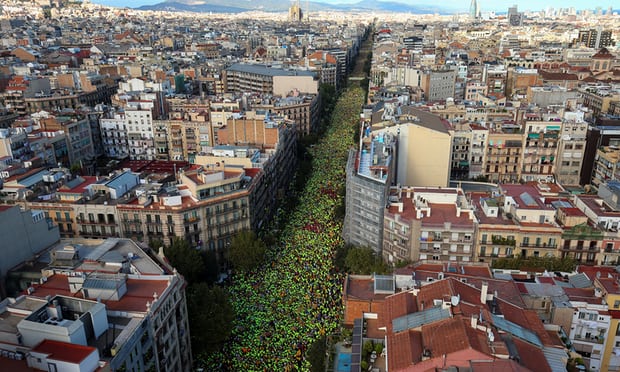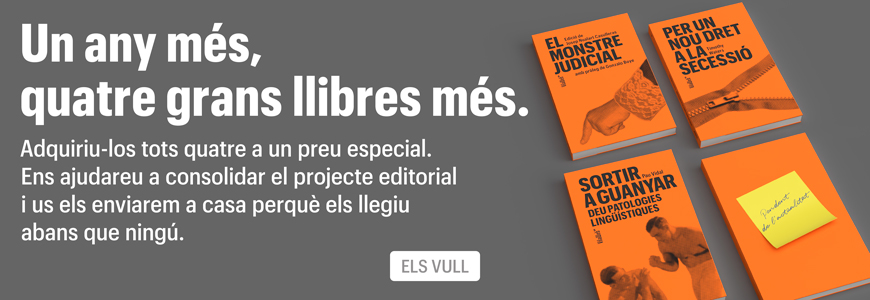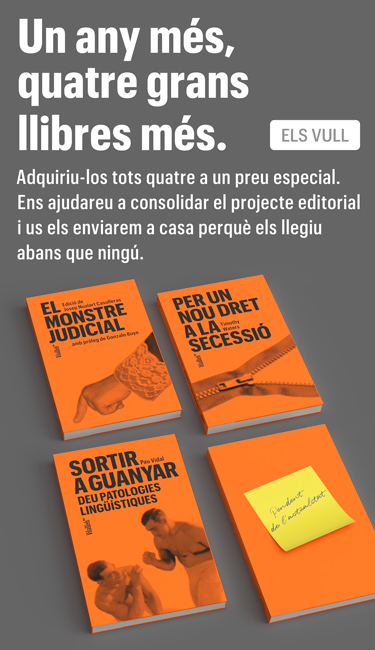11.09.2017 - 21:07
Up to a million Catalans have gathered in Barcelona to call for independence less than three weeks before the region is due to hold a vote on whether to break away from Spain.
For the sixth successive year, Catalonia’s national day – La Diada de Catalunya – was used as a political rally by the pro-independence movement. Organisers said 450,000 people had registered for the event, and Barcelona police later tweeted that 1 million turned up.
The Spanish government has vowed to stop the referendum going ahead on 1 October, but the Catalan regional government is refusing to back down and polls suggest a clear majority of people in the wealthy north-eastern region want to be allowed to vote.
Polls also show that Catalans are divided on whether they wish to secede from Spain. A survey at the end of July found that 49.4% of Catalans were against independence and 41.1% supported it.

The no campaigners were conspicuous by their absence in central Barcelona on Monday afternoon as the city’s sunny avenues filled with pro-independence estelada flags flown from balconies, worn as capes and displayed on T-shirts.
Stationed along the streets were Catalan police officers cradling pump-action shotguns and submachine guns – a reminder of the terrorist atrocities inflicted on Barcelona and the coastal town of Cambrils last month. But, despite the raw memories and the looming showdown with Madrid, the mood was light.
Vila said the Diada’s meaning and significance had shifted over recent years as the independence cause gained momentum. What was once a commemoration of the fall of Barcelona during the Spanish war of succession on 11 September 1714 was now a show of Catalan strength.
“It lets people show how much they want independence,” said Vila. “I think we have to be allowed to vote – but I also think the Spanish government is capable of anything when it comes to stopping the vote.”
At 5pm, after a minute’s silence for the victims of the terror attacks, the Catalan national anthem, Els Segadors, rang out along the boulevards as helicopters clattered above. Later, huge banners printed with the words pau (peace), sí and “referèndum és democràcia” made their way over the heads of the crowds.
Helena Casador, a 23-year-old student from Tarragona, had come to Barcelona with her friends Júlia and Inma. All three said the referendum needed to be held. “It’s about defending what we believe in, which is independence,” said Casador. “It will go ahead because people are prepared to defy the state. We did it before [in a symbolic referendum] on 9 November 2014, and we’ll do it again.”
The Catalan president, Carles Puigdemont, was in a similarly defiant mood on Monday morning. Brushing aside the fact that Spain’s constitutional court has suspended the referendum legislation that was hastily passed in the Catalan parliament last week – and that prosecutors are looking into whether he and others ministers should be charged with disobedience and abuse of power – Puigdemont said there was not “enough power” to thwart the wishes of democratic Catalans.
“This Diada isn’t going to be like previous one because the self-determination referendum has been called for 1 October,” he said. “There are just 20 days to go.”
Raül Romeva, the Catalan foreign affairs minister, told reporters that the referendum had already begun, with expatriate Catalans voting by post.
“You need to remember that people are already voting,” he said. “The Catalan community abroad is already voting. Those people who say there’ll be no referendum forget that the referendum is already under way.”
In a speech to mark the Diada, Ada Colau, the mayor of Barcelona, criticised the Spanish government’s response to the referendum but pointed out that the Catalan government’s unilateral rush towards independence had “left out half the people of Catalonia”.
For Jordi Sala, a 41-year-old teacher from Reus who was wandering among the book stalls near the cathedral with an estelada hanging around his neck, 1 October was about simple democratic representation.
“It’s not about voting yes or voting no, it’s just about being able to vote democratically,” he said. “That said, I will be bit sad if the no camp wins.”
But how certain was he that the referendum would even take place? “My heart says the vote will go ahead but my head is a little more doubtful.”



